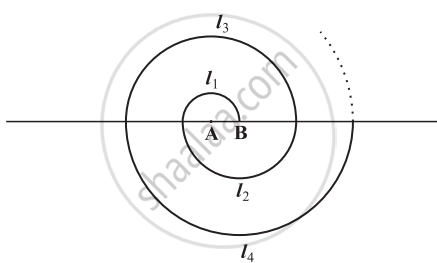Advertisements
Advertisements
प्रश्न
If the sum of P terms of an A.P. is q and the sum of q terms is p, then the sum of p + q terms will be
पर्याय
0
p − q
p + q
−(p + q)
उत्तर
In the given problem, we are given Sp = q and Sq = p
We need to find S p+q
Now, as we know,
`S_n = n/2 [2a + (n-1) d]`
So,
`S_p = p/2 [2a + (p - 1) d]`
`q = p/2 [ 2a + ( p - 1)d]`
`2q = 2ap + p (p-1)d` ............(1)
Similarly,
`S_q = q/2 [ 2a + (q-1) d]`
`p = q/2 [2a + (q-1)d]`
`2p = 2ap + q(q-1)d` ...............(2)
Subtracting (2) from (1), we get
2q - 2p = 2ap + [p ( p - 1) d ] - 2 aq - [q (q-1)d]
2q - 2 p = 2a (p-q) + [ p (p-1) - q(q-1)]d
-2(p-q) = 2a(p - q) + [(p2 - q2) - ( p - q)]
-2 = 2a + ( p + q - 1 ) d ................(3)
Now,
`S_(p+q) = (p+q)/2 [2a + (p+q - 1)d]`
`S_(p+q) = ((p+q))/2 (-2)` ........(Using 3)
`S_(p+q) = - (p+q)`
Thus, `S_(p+q) = - (p+q)`
APPEARS IN
संबंधित प्रश्न
Find the sum of the following APs:
2, 7, 12, ..., to 10 terms.
A spiral is made up of successive semicircles, with centres alternately at A and B, starting with centre at A of radii 0.5, 1.0 cm, 1.5 cm, 2.0 cm, .... as shown in figure. What is the total length of such a spiral made up of thirteen consecutive semicircles? (Take `pi = 22/7`)

[Hint: Length of successive semicircles is l1, l2, l3, l4, ... with centres at A, B, A, B, ... respectively.]
If (m + 1)th term of an A.P is twice the (n + 1)th term, prove that (3m + 1)th term is twice the (m + n + 1)th term.
Find the sum of all integers between 100 and 550, which are divisible by 9.
Write an A.P. whose first term is a and common difference is d in the following.
a = –19, d = –4
In an A.P. 19th term is 52 and 38th term is 128, find sum of first 56 terms.
In an A.P. the first term is 8, nth term is 33 and the sum to first n terms is 123. Find n and d, the common differences.
The first and last term of an A.P. are a and l respectively. If S is the sum of all the terms of the A.P. and the common difference is given by \[\frac{l^2 - a^2}{k - (l + a)}\] , then k =
Find whether 55 is a term of the A.P. 7, 10, 13,... or not. If yes, find which term is it.
The sum of the first 15 multiples of 8 is ______.
